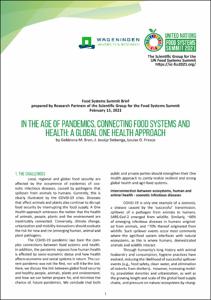Bron, Gebbiena M.; Siebenga, J. Joukje; Fresco, Louise O.: In the age of pandemics, connecting food systems and health: a Global One Health approach : Food Systems Summit Brief prepared by Research Partners of the Scientific Group for the Food Systems Summit February 15, 2021.
Online-Ausgabe in bonndoc: https://doi.org/10.48565/scfss2021-z850
Online-Ausgabe in bonndoc: https://doi.org/10.48565/scfss2021-z850
@article{handle:20.500.11811/9144,
doi: https://doi.org/10.48565/scfss2021-z850 ,
author = {{Gebbiena M. Bron} and {J. Joukje Siebenga} and {Louise O. Fresco}},
title = {In the age of pandemics, connecting food systems and health: a Global One Health approach : Food Systems Summit Brief prepared by Research Partners of the Scientific Group for the Food Systems Summit February 15, 2021},
publisher = {Center for Development Research (ZEF) in cooperation with the Scientific Group for the UN Food System Summit 2021},
year = 2021,
month = feb,
note = {Local, regional and global food security are affected by the occurrence of epidemics of zoonotic infectious diseases, caused by pathogens that spillover from animals to humans. Currently, this is clearly illustrated by the COVID-19 crisis. Diseases that affect animals and plants also continue to disrupt food security by interrupting the food supply. A One Health approach embraces the notion that the health of animals, people, plants and the environment are inextricably connected. Conversely, climate change, urbanization and mobility innovations should evaluate the risk for new and (re-)emerging human, animal and plant pathogens. The COVID-19 pandemic lays bare the com- plex connections between food systems and health. In addition, the pandemic exposes how human health is affected by socio-economic status and how health affects economic and social systems in return. The cur- rent pandemic was not the first, nor will it be the last. Here, we discuss the link between global food security and healthy people, animals, plants and environment, and how we can better prepare for, and minimize the chance of, future pandemics. We conclude that both public and private parties should strengthen their One Health approach to jointly realize resilient and strong global health and agri-food systems.},
url = {https://hdl.handle.net/20.500.11811/9144}
}
doi: https://doi.org/
author = {{Gebbiena M. Bron} and {J. Joukje Siebenga} and {Louise O. Fresco}},
title = {In the age of pandemics, connecting food systems and health: a Global One Health approach : Food Systems Summit Brief prepared by Research Partners of the Scientific Group for the Food Systems Summit February 15, 2021},
publisher = {Center for Development Research (ZEF) in cooperation with the Scientific Group for the UN Food System Summit 2021},
year = 2021,
month = feb,
note = {Local, regional and global food security are affected by the occurrence of epidemics of zoonotic infectious diseases, caused by pathogens that spillover from animals to humans. Currently, this is clearly illustrated by the COVID-19 crisis. Diseases that affect animals and plants also continue to disrupt food security by interrupting the food supply. A One Health approach embraces the notion that the health of animals, people, plants and the environment are inextricably connected. Conversely, climate change, urbanization and mobility innovations should evaluate the risk for new and (re-)emerging human, animal and plant pathogens. The COVID-19 pandemic lays bare the com- plex connections between food systems and health. In addition, the pandemic exposes how human health is affected by socio-economic status and how health affects economic and social systems in return. The cur- rent pandemic was not the first, nor will it be the last. Here, we discuss the link between global food security and healthy people, animals, plants and environment, and how we can better prepare for, and minimize the chance of, future pandemics. We conclude that both public and private parties should strengthen their One Health approach to jointly realize resilient and strong global health and agri-food systems.},
url = {https://hdl.handle.net/20.500.11811/9144}
}






